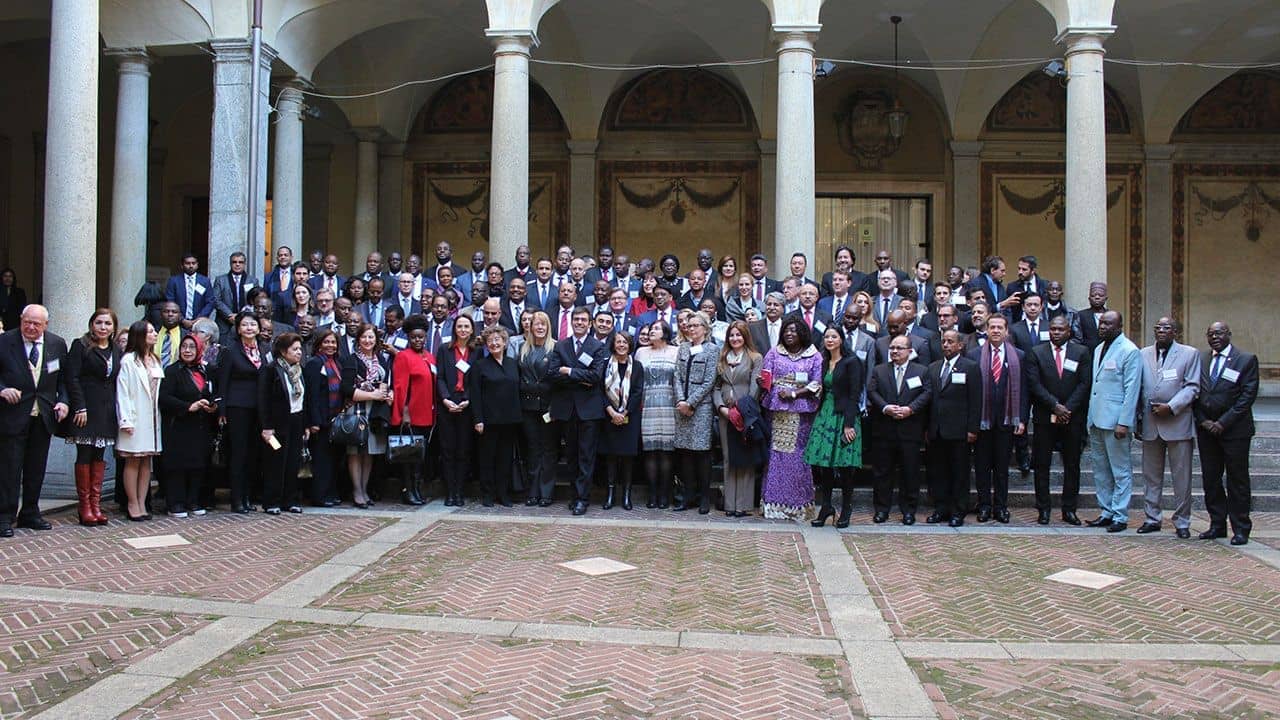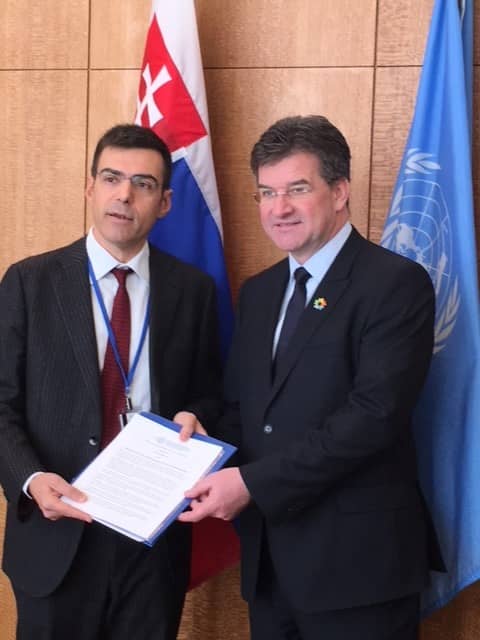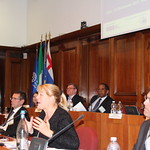

Milan Forum for Parliamentary Action in Preventing
Violent Extremism and Mass Atrocities
39TH ANNUAL FORUM OF PARLIAMENTARIANS FOR GLOBAL ACTION
Under the patronage of

And the patronage of the European Parliament

Institutional Partners: |
|
|
|
|
Hosted by: |
|
|
|
|
27 - 28 November 2017
Palazzo Isimbardi
Corso Monforte 35, Milano, Italia
The international community is confronted with dangerous extremist ideologies that are used to justify mass atrocity crimes against civilians. This threat needs to be addressed in a holistic, integrated and multidimensional way, in particular through the building of more resilient democratic governance in all regions of the world, from the Middle East and North Africa (MENA) to the Sahel and Eastern regions of Africa to Southeast Asia, to pave the way for sustainable peace and stability. Effective measures and standards are necessary to remedy the spread of violent extremism and the perpetration of mass atrocities. So far, violence by extremist groups such as ISIS, Al Shabab, Boko Haram, Al Qaeda and other similar networks has been primarily countered through security and military measures, but the time has come to mobilize influential leaders at the National level to tackle the root causes of the problem.
The Milan Forum for Parliamentary Action in Preventing Violent Extremism and Mass Atrocities was organized in partnership with the Montreal Institute of Genocide and Human Rights Studies (MIGS) and the Stanley Foundation and hosted by the Mayor of Milan, with the institutional patronage of the Italian Parliament (Senate of the Republic and Chamber of Deputies. The goal of the Forum was to educate, sensitize and mobilize parliamentarians to adopt and implement effective policies to protect civilian populations from mass atrocities and marginalize the ideology of violent extremists while promoting human rights, inclusion, democracy and good governance, the Rule of Law, gender equality and healthy civil societies. While the ideology of violent extremism is often associated with the criminal phenomenon of terrorism, the Milan Forum will offer a unique opportunity to highlight the link and nexus of causality between extremism and mass atrocity crimes, including crimes against humanity, which encompass a scale and degree of victimization of the civilian population that is much more severe than the one produced by terrorism.
In line with the leadership shown by PGA in the field of International Criminal Justice, this project was centered on justice and the Rule of Law as crucial elements of any viable strategy and policy aimed at addressing the impunity-gap of mass atrocity crimes allegedly committed by violent extremists.
Early warning measures, mechanisms and systems to detect atrocities were thoroughly analyzed with the view of empowering Parliamentarians and other policy-makers to undertake policies and practices that may effectively marginalize violent extremists and eradicate oppressive policies that provide a fertile ground for the recruitment of individuals into violent extremist groups.
The Milan Forum included presentations by legislators; academics; civil society and UN experts, including Ms. Virginia Gamba, Under-Secretary-General & Special Representative of the Secretary-General for Children and Armed Conflict, and Mr. Ivan Simonovic, Assistant-Secretary-General & Special Advisor to the UN Secretary-General on the Responsibility to Protect.
The agenda for the two-day session consisted of:
- An opening session on preventing and countering violent extremism and mass-atrocities with key-note addresses by relevant European and Italian high-level authorities, welcome-remarks by the Mayor of Milan, introductory remarks by two parliamentarians leading the international network of PGA and the PGA-Italy Organizing Committee, as well as the representative of co-convening/co-organizing institution(s); and a thematic address delivered by the Italian Minister of Home Affairs.
- Interactive sessions with legislators and subject matter experts to develop goals and action-oriented strategies in specific areas of legislative, policy-making and parliamentary-oversight intervention:
- Prevention of radicalization: the role of politics, culture, justice, religion and technology towards the marginalization and isolation of the ideology of violent extremism, identified as one of the drivers behind the planning and perpetration of mass atrocities;
- Rehabilitation of children enslaved by ISIS or other extremist groups and indoctrinated to violent extremism and mass-atrocity policies, within the framework of appropriate reparations for victims of mass-atrocity crimes;
- Gender-equality and role of women in the eradication of the ideology/ies of violent extremism: how to put an end to child, early and forced marriage?
- Relationship between armed conflict, terrorism and violent extremism and the effectiveness of prevailing counter-terrorism policies and practices: Assessing the effectiveness of 16 years of counter-terrorism/war on terror and the use of armed force in Syria, Iraq and other conflict-situations directly affected by violent extremist groups;
- The role of justice and human rights under the Rule of Law in effective policies to prevent genocide and mass atrocities, including the role of the International Criminal Court; the International, Impartial and Independent Mechanism (IIIM) to Assist in the Investigation and Prosecution of Those Responsible for the Most Serious Crimes under International Law Committed in Syria; and other mechanisms of international cooperation to support access to justice for victims;
- Promoting a healthy civil society to counter the rise of violent extremism: The shrinking space for civil society with particular reference to growing restrictions on freedom of expression and assembly, as well as foreign funding of human rights activism;
- Prevention and suppression of access to conventional weapons and weapons of mass destruction, in particular biological and bacteriological weapons.
In addition, the Milan Forum featured PGA’s Defender of Democracy Award Ceremony to honor individuals who have demonstrated exceptional commitment and contribution to promoting peace, democracy, the rule of law, human rights, non-discrimination and/or gender equality. Their actions support PGA’s vision, namely “to contribute to the creation of a rules-based international order for a more equitable, safe and democratic world.” In 2017, the DDA Award will be presented to a Yazidi woman human rights activist formerly enslaved by ISIS. The ceremony provided an important platform for victims of mass atrocity crimes and highlight effective civil society responses to violent extremism and crimes against humanity.
Italian Organizing Committee
PGA Italy members of Parliament (partial list*)
- Dep. Deborah Bergamini
- Dep. Alessandro di Battista
- Dep. Titti Di Salvo
- Dep. Gregorio Fontana, FI
- Dep. Mario Marazziti
- Dep. Pia Elda Locatelli
- Dep. Lia Quartapelle (Coordinator, PGA Italia)
- Dep.Vinicio Peluffo
- Sen. Paolo Romani
- Dep. Marina Sereni (Deputy-Speaker)
- Dep. Irene Tinagli
(* Other PGA Members are not listed here because they are currently holding the function of Ministers while maintaining their position as MPs)
Other MPs
- Mr. Stefano Dambruoso, MP (Coordinator of the Anti-Terrorism All Party Parliamentary Group)
- Mr. Andrea Manciulli, MP (Head of the Italian Delegation to the NATO Parliamentary Assembly)
Italian Parliamentary Institutions
- Mr. Mario Di Napoli (Capo Ufficio della Segreteria generale preposto alla direzione dell’Ufficio del Cerimoniale; già coordinatore delle attività di “diplomazia parlamentare”, Camera dei Deputati)
- Prof. Luigi Gianniti (Direttore Servizio Studi e Responsabile Rapporti con le istituzioni dell'Unione Europea, Senato della Repubblica)
European Parliament and Commission
- Ms. Patrizia Toia, MEP (Member of the Parlamentary Assembly Euronest: UE + Armenia, Azerbaijan, Georgia, Moldova and Ukraine)
- Mr. Bruno Marasà – Director, Milan Office of the European Parliament
- Mr. Massimo Gaudina – European Commission Milan Office
Italian Government
- Sen. Benedetto Della Vedova – Under-Secretary of State for Foreign Affairs and International Cooperation
City of Milan
- Ms. Anna Scavuzzo – Deputy-Mayor
- Mr. Mario Vanni (Capo di Gabinetto del Sindaco Giuseppe Sala)
- Ms. Vittoria Beria (Direttore Area Relazioni internazionali)
Metropolitan City of Milano
- Ms. Arianna Censi (Vice Sindaca metropolitana)
Regione Lombardia
- Mr. Gianni Fava (Assessore all’agricoltura)
Judiciary
- Mr. Roberto Bichi – President, Tribunal of Milan
- Mr. Rosario Aitala – Magistrate at the Office of the Prosecutor of Rome; candidate for the position of Judges of the International Criminal Court (2018-2026); Former advisor to the President of the Senate for international affairs
University and Think Tanks
- Prof. Franco Anelli – Rettore, Università Cattolica del Sacro Cuore, Milano
- Prof. Cristina Messa – Rettore, Università degli Studi di Milano-Bicocca
- Amb. Giampiero Massolo – President, ISPI
- Dr. Arturo Varvelli – Responsabile programma Terrorismo, ISPI
- Prof. Lorenzo Vidino – Director, Anti-Extremism Program, George Washington University
- Prof. Fausto Pocar – Ad hoc Judge, International Court of Justice, The Hague; former Judge and President, International Criminal Tribunal for the former Yugoslavia (ICTY); Faculty of Political Sciences, University of Milan
- Prof. Flavia Lattanzi –; former Ad litem Judge, ICTY, The Hague, and International Criminal Tribunal for Rwanda (ICTR), Arusha; former member of the International Humanitarian Fact-Finding Commission, Geneva; Law Faculty, Università LUISS Guido Carli, Roma
- Prof. Giuseppe Nesi –Vice-president, Italiana Society of International Law (SIDI); Dean, Law Faculty, Università di Trento
Civil Society
- H.E. Mario Delpini – Archbishop of Milan
- Mr. Janiki Cingoli – Director, Centro Italiano per la Pace in Medio Oriente (CIPMO)
- Mr. Carlo Feltrinelli – President, Fondazione Giangiacomo Feltrinelli
- Don Virginio Colmegna – President, Fondazione Casa della Carità
- Mr. Stefano Allievi – Founder, International Forum for Democracy & Religions
- Ms. Carola Carazzone – Segretary-General, ASSIFERO (Associazione Italiana Fondazioni ed Enti della Filantropia Istituzionale)
- Mr. Enzo Maria Le Fevre Cervini – Director for Research and Cooperation, Budapest Centre for Mass Atrocities Prevention;
Media
- Ms. Marta Serafini – Corriere della Sera
- Mr. Francesco De Leo – Radio Radicale









